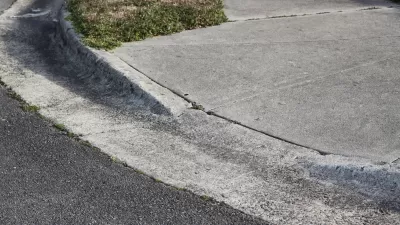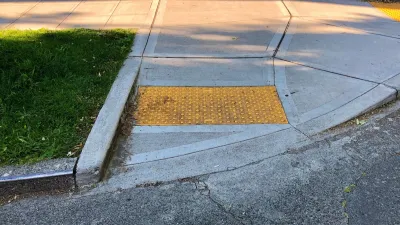Next City examines the fruits of a Department of Justice effort to force cities to bring their sidewalks and other public spaces into compliance with the Americans with Disabilities Act.

"A generation after the Americans with Disabilities Act, cities across the United States are still broadly inaccessible to many who live in them," according to an article by Anna Clark.
To describe the consequences of that inaccessibility, Clark writes: "According to 2010 census data, 56.7 million Americans have a disability. Yet, infrastructure that many citizens barely notice presents barriers and sends a disturbing, albeit inadvertent, message to their neighbors: You don’t belong here."
Yet people with disabilities still have one powerful counter-measure to the inattention to access: litigation. As a case study, Clark examines Cedar Rapids, Iowa, where the city adopted a much more Americans with Disabilities Act-friendly approach when "the Department of Justice began questioning the city’s overall ADA compliance" as the city rebuilt following the devastating floods of 2008. Clark calls especially on the expertise of Cedar Rapids Assistant City Manager Sandi Fowler and Des Moines-based non-profit Disability Rights Matter on what it takes to make a city accessible for everyone.
Also, for the record, Clark adds that the "Cedar Rapids settlement is one of more than 215 DOJ agreements of its kind under Project Civic Access, including 15 settlements nationwide last year." The long-read article thus has many additional case studies to choose from, such as Los Angeles, which "last year pledged to spend $1.3 billion over three decades for massive infrastructure improvements — including fixing notoriously crumbling sidewalks — to meet ADA accessibility standards."
FULL STORY: Suing for Sidewalks

Alabama: Trump Terminates Settlements for Black Communities Harmed By Raw Sewage
Trump deemed the landmark civil rights agreement “illegal DEI and environmental justice policy.”

Study: Maui’s Plan to Convert Vacation Rentals to Long-Term Housing Could Cause Nearly $1 Billion Economic Loss
The plan would reduce visitor accommodation by 25% resulting in 1,900 jobs lost.

Planetizen Federal Action Tracker
A weekly monitor of how Trump’s orders and actions are impacting planners and planning in America.

Wind Energy on the Rise Despite Federal Policy Reversal
The Trump administration is revoking federal support for renewable energy, but demand for new projects continues unabated.

Passengers Flock to Caltrain After Electrification
The new electric trains are running faster and more reliably, leading to strong ridership growth on the Bay Area rail system.

Texas Churches Rally Behind ‘Yes in God’s Back Yard’ Legislation
Religious leaders want the state to reduce zoning regulations to streamline leasing church-owned land to housing developers.
Urban Design for Planners 1: Software Tools
This six-course series explores essential urban design concepts using open source software and equips planners with the tools they need to participate fully in the urban design process.
Planning for Universal Design
Learn the tools for implementing Universal Design in planning regulations.
Caltrans
Smith Gee Studio
Institute for Housing and Urban Development Studies (IHS)
City of Grandview
Harvard GSD Executive Education
Toledo-Lucas County Plan Commissions
Salt Lake City
NYU Wagner Graduate School of Public Service




























